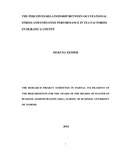| dc.description.abstract | Stress is a universal element experienced by employees around the globe and it has
become a major problem for employers particularly in developing nations like Kenya
where the employer doesn’t realize its impact in the organization. The objective of this
study was to determine the perceived relationship between occupational stress and
employee performance in tea factories in Murang’a County. To achieve the objectives of
the study, the research was conducted in all the 8 tea factories in the County across all the
categories of employees in order to get the most justified opinions on stress and
performance.The study used primary data which was collected using a self-administered
structured questionnaire. The population of the study comprised all the employees in the
8 tea factories in Murang’a County who are approximately 800 in total. The
questionnaires were issued to 1 top manager, 4 technical employees and 15 short
contract/casual employees per factory in all the 8 factories. The questionnaire comprised
of three parts: Part A: the Demographic Information of the respondents, Part B: Indicators
and Causes of stress in the factories and part C: Employee Performance Measures in the
factories. The data was collected and analyzed quantitatively using descriptive statistics
of mean and standard deviation and also using the Pearson product moment correlation
analysis. The study revealed that employees in the factories indicated the existence of
stress by portraying behaviors such as labor turnover, many complain and grievances,
headaches and dizziness,absenteeism and withdrawal tendencies. The study also
indicated that there are many causes of stress in the factories and these are: the employees
feel underutilized, they have high workload, and they face unequal treatment, poor
leadership, poor remuneration, poor employee relations and poor working conditions
characterized by high levels of noise, high temperatures, poor air circulation and
exposure to physical injury.Additionally, the study revealed that performance in the tea
factories is at stake because the employees portray behaviors such as lack of
commitment, poor customer service, tardiness, ineffective usage of time, lack of total
fairness while dealing with people and disclosure of confidential information just to
mention a few.The limitation for this study was that the study was carried out within a
limited time frame and resources which constrained the scope and depth of the study.This
necessitated the adoption of a descriptive survey research design hence these findings
cannot be used to make generalizations regarding the impact of stress on employee
performance in other tea factories in Kenya. | en_US |

